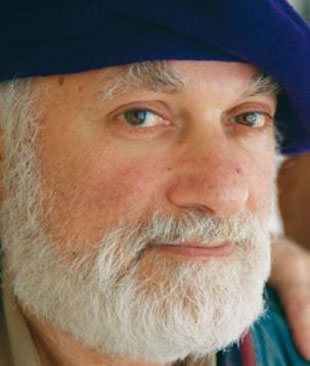Work with the Muddy Water
"The pure lotus growing in muddy water is a metaphor for enlightenment. The lotus arises from all its impediments. It actually needs the impurity of the water for its nourishment. In the same way, in our own personal development, we can't just work with what we like about ourselves. We have to work with our muddy water. We have to work with our problems and hang-ups because that's where the action is."
— Instructions to the Cook: A Zen Master's Lessons in Living a Life That Matters
Beautiful Surroundings
"Beautiful surroundings inspire people to live more fully and to appreciate the preciousness of our world and each other. The beauty of art and nature also reminds us of the inner harmony and splendor that is every human being's birthright. The Japanese understand this very well. Every house or noodle shop, no matter how humble, contains a tokonomo — a niche to hang a painted scroll and exhibit a small flower arrangement. It's a small thing, but it uplifts the spirit and adds dignity and grace to everyday life."
— Instructions to the Cook: A Zen Master's Lessons in Living a Life That Matters
Not Knowing
"As soon as we know something, we prevent something else from happening. When we live in a state of knowing, rather than unknowing, we're living in a fixed state of being where we can't experience the endless unfolding of life, one thing after another. Things happen anyway — nothing ever remains the same — but our notions of what should happen block us from seeing what actually does happen. We get upset because our expectations aren't met. When we can let go of them we are in accord with things as they arise.
"We like to use the phrase 'let it be.' The truth is, we have no choice. No matter what we think, we are never in control and things will happen as they happen. But in a state of unknowing we actually live without attachment to preconceived ideas. There is no expectation of gain, no expectation of loss. There's just what's here right now."
— Bearing Witness: A Zen Master's Lessons in Making Peace
Don't Cast Out Anyone
"The Jewish scholar and thinker Rabbi Abraham Isaac Kook said that the Circle of Life includes many groups of all kinds. If you eliminate even one group — for example, if you eliminate atheists — you eliminate the entire circle. The minute you've discarded one part of the whole, you've discarded the whole. And, in fact, a famous Jewish commentary of the importance of not killing says that he who saves just one life has saved the entire world.
"As I said when I described the Net of Indra, each pearl reflects not just its neighboring pearl but all the pearls, the entire net. Each person, each phenomenon, contains our infinitely diverse universe."
— Bearing Witness: A Zen Master's Lessons in Making Peace
Healing Myself and Others
"It's a myth that spiritual people are not attached, that they're somehow above the trials and tribulations of ordinary life. Not only are they affected by things, they're tremendously affected by them. For rather than living in the realm of ideas and feelings about suffering, they live in the realm of action.
"How do they know what action to take? How do they know how to heal?
"When we bear witness, when we become the situation — homelessness, poverty, illness, violence, death — the right action arises by itself. We don’t have to worry about what to do. We don't have to figure out solutions ahead of time. Peacemaking is the functioning of bearing witness. Once we listen with our entire body and mind, loving action arises.
"Loving action is right action. It's as simple as giving a hand to someone who stumbles or picking up a child who has fallen on the floor. We take such direct, natural actions every day of our lives without considering them special. And they're not special. Each is simply the best possible response to that situation in that moment.
"In the Zen Peacemaker Order we commit ourselves to healing others at the same time that we heal ourselves. We don't wait to be peaceful before we begin to make peace. In fact, when we see the world as one body, it's obvious that we heal everyone at the same time that we heal ourselves, for there are no 'others.'
— Bearing Witness: A Zen Master's Lessons in Making Peace
What We All Have in Common
"Sameness is the fact that everything is unique just as it is. Each and every thing is different. That difference is the only thing we and everything in the world have in common. As human beings, we like to think that there's something we all share. For instance, we often say that all people want the same basic things or care about the same things. But the truth is, we're all different. In fact, the only thing we have in common, the only thing that's the same about us, is that we're different."
— Infinite Circle: Teachings in Zen
